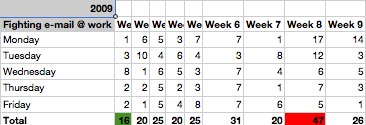 Last week I mentioned in Twitter how during the course of the week I’d be putting together a rather compelling and thought-provoking entry where I would detail how folks could kill over 85% of the incoming e-mails they get on a daily basis. Yet, in the end, I didn’t manage to publish it, more than anything else, because, at a certain point, I got carried away and added some additional materials into the mix. And thus the draft needs further editing. This week though, that post will go up and I am surely hoping it would help folks find their way to, finally, move away from corporate email.
Last week I mentioned in Twitter how during the course of the week I’d be putting together a rather compelling and thought-provoking entry where I would detail how folks could kill over 85% of the incoming e-mails they get on a daily basis. Yet, in the end, I didn’t manage to publish it, more than anything else, because, at a certain point, I got carried away and added some additional materials into the mix. And thus the draft needs further editing. This week though, that post will go up and I am surely hoping it would help folks find their way to, finally, move away from corporate email.
But today I am going to go back and share with you folks further insights on the weekly progress reports from my daily living “A World Without Email“, plus a couple of interesting links I have bumped into over the last few days. You would remember how last week I was a bit concerned at the prospect of seeing the highest number of incoming emails per week since the beginning of the year and I was surely hoping that things would tame themselves a bit. And they surely have. I am not certain whether it was down to the progress report related post I put together or to the upcoming long holiday break. The end result is that the numbers got substantially lower for Week 9, as can be seen from the following snapshot:
Yes, I know, not close enough to that follow up target of 20 emails a week or less, but with 26, coming from a whopping 47!, I guess we are back in track again with things, don’t you think? Specially noteworthy is how Monday last week seemed to have been a rather hectic day and I supposed that was mainly due to folks preparing for a long holiday break taking place on Thursday and Friday, where the incoming count went really low. Thus I would suspect things will be different for week 10… And they are, but that’d would be the subject for another blog post at a later time.
Let’s move on now into the interesting couple of links I bumped into in the last few days, which I am sure folks out there are going to find interesting and somewhat humourous, at least, one of them.
Head over to PCWorld‘s “What Your Webmail Choice Reveals About You” where you will be able to see for yourself how, depending on which Web mail system you may be using at the moment, you would be flagged one way or another. Rather amusing read, to be honest, specially the end of it with this precious gem shared across under No E-mail Account:
“Typical user: You are in your late teens or early 20s and you equate sending e-mails with using a fax machine, watching broadcast TV or buying CDs — lame. You text and/or IM, and that’s it. TTYL“
Well, not quite just yet, but getting there … 😀
Check though this other much more provocative and mind-boggling article published by Mike Elgan over at Computerworld under the title “How to kill e-mail (before it kills you)” where he gets to describe some of the most comprehensive and compelling reasons I have read in a long while on why e-mail is perhaps not the best of communication / collaboration tools we have at the moment. And why now is probably the perfect time to re-think how we make extensive use of it. Or not. Here are a couple of interesting and relevant quotes towards living “A World Without Email“:
“E-mail has become a pandemic social disease. The more you get, the more you send. And the more you send, the more you get.“
Or this other one:
“What’s wrong with e-mail? In a nutshell, the medium is perfectly designed for information overload. Both message size and quantity are essentially unlimited. Unfortunately, electronic communication is like a gas: It expands to fill its container.“
Or this other one, incredibly insightful and very much along the lines of what I have been saying myself all along on the power of the spoken vs. the written word:
“E-mail has always suffered from another flaw: It facilitates miscommunication. When you’re typing out words, you’re thinking one thing, but the receiver can perceive your intent as something else. You’re being funny. They perceive hostile. The reason is that humans are designed to communicate with words, facial expressions, body language and hand gestures all together. When you send only cold, black-and-white words, the other person can easily read into your message inaccurate intent or emotional content.“
You can go and read further on the article by going over here. I can surely state it would be worth while your time. Not only because Mike keeps addressing some of the main issues e-mail is suffering from for a while now, but also from the perspective that he ventures into providing some sound advice on how to diversify your Inbox and bring into the mix an alternative set of tools to help you manage your time, and your email interruptions, in a much more productive manner:
- Set up a Twitter account
- Set up a “public” e-mail account as a data repository
- Set up a “secret” e-mail account for content
- Set up a Facebook account
- Set up a Skype account and get a webcam
I know most of us have made extensive use of these tools, but throughout the commentary from that article you would be able to see how most people are skeptical that such a system could work, more than anything else because of a number of issues people have identified with applications like Facebook or Twitter. But, to me the important and relevant question would be, what happens when you implement such a system behind the firewall with real Enterprise Social Software?
That is, when you have applications like Facebook, Twitter or Skype directly available behind the firewall, with whatever other name and with the same kind of quality and service as other traditional tools you are used to. Is the skepticism still realistic? Are people’s comments on Mike’s article consistent enough? Does it sound like a chimera as much as initially thought? Or is it something that could be put to the test and see if it would meet your needs and, eventually, help you make your final move away from corporate email?
Well, stay tuned, because that is exactly what I am going to cover in that upcoming blog post I started this entry with; you will see how it’s a lot easier than whatever you may have thought thus far …
Tags: Enterprise 2.0, Social Software, Social Networking, Social Computing, Social Media, Collaboration, Communities, Learning, Knowledge Sharing, KM, Knowledge Management, Remote Collaboration, Innovation, IBM, Networking, Social Networks, Conversations, Dialogue, Communication, Connections, Relationships, email, Productivity, Re-purposing Email, No-Email, Challenge Your Inbox, Progress Reports, Thinking Outside the Inbox, Information Overload, Twitter, PCWorld, Mike Elgan, Computerworld, Kill Email, Facebook, Skype, Enterprise Social Software

I was thinking about your experiment yesterday, Luis, when I realized that I am still addicted to my email. And the idea that the next generation only uses more transitory communications solutions eludes me — how do they go back and find something later?
I thoroughly applaud your effort on the professional front: as a knowledge worker, email is NOT the best solution.
But on a personal front, communicating with my friends and family, it still has a great deal of value. Not all of the interactions I have with people fit in Facebook.
Hi Alora, thanks a bunch for the feedback comments and for the information details. I must say that I had similar concerns when I was first entering this email-less world and to be honest those concerns disappear within a couple of days…
To your query on how do they go back and find something later … mostly through a good search engine (a la Google); most of the social networking tools rely on a good search engine to be able to re-find the content; and as such that’s what they would be expecting … to work with a good search engine.
Also the fact most of those folks are using using feed aggregators, specially in a working environment would allow them to search quickly for content and then re-use it again, if needed. After all all of those feeds are offline ones.
Funny enough, w.r.t. your comment on personal communications, email is the one tool I hardly use for those personal interactions; I don’t mind sharing some of my personal stuff out there on the various social networks and be part of the overall network. However, it is not something I do with the really close and personal stuff with family and friends. That’s something I learned a while ago to respect.
If they don’t want to be up there on the social networking space, there is no need for us to be there. We use other, much more, immediate tools, not even email: IM, VoIP and the good old phone call addresses our needs. At least, for the last few years… We shall see if it would hold in another 2 to 5 years …
Thanks again for dropping by and surely agree with your comment that email may not be the best solution, and although we may all be addicted to it, there may be a chance for us to start looking elsewhere, too! 🙂
Thanks for dropping by!